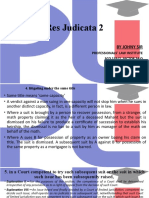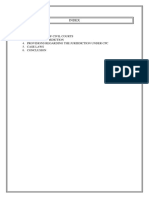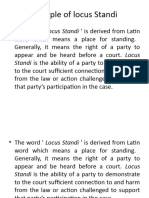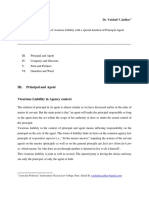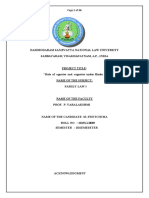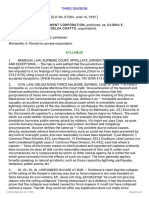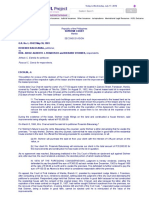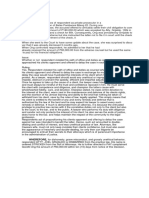100%(2)100% found this document useful (2 votes)
481 viewsJurisdiction
Jurisdiction
Uploaded by
Pragya GuptaThe document discusses jurisdiction of civil courts under Indian law. It provides that civil courts have jurisdiction over suits of a civil nature, unless jurisdiction has been expressly or impliedly barred. A suit is considered civil in nature if the principal question relates to determining and enforcing civil rights. The jurisdiction of civil courts is determined based on the allegations in the plaintiff's plaint. While the defendant's written statement is not determinative, the substance of the matter must be considered over the form.
Copyright:
© All Rights Reserved
Available Formats
Download as PPTX, PDF, TXT or read online from Scribd
Jurisdiction
Jurisdiction
Uploaded by
Pragya Gupta100%(2)100% found this document useful (2 votes)
481 views64 pagesThe document discusses jurisdiction of civil courts under Indian law. It provides that civil courts have jurisdiction over suits of a civil nature, unless jurisdiction has been expressly or impliedly barred. A suit is considered civil in nature if the principal question relates to determining and enforcing civil rights. The jurisdiction of civil courts is determined based on the allegations in the plaintiff's plaint. While the defendant's written statement is not determinative, the substance of the matter must be considered over the form.
Original Description:
meaning of jurisdiction
Copyright
© © All Rights Reserved
Available Formats
PPTX, PDF, TXT or read online from Scribd
Share this document
Did you find this document useful?
Is this content inappropriate?
The document discusses jurisdiction of civil courts under Indian law. It provides that civil courts have jurisdiction over suits of a civil nature, unless jurisdiction has been expressly or impliedly barred. A suit is considered civil in nature if the principal question relates to determining and enforcing civil rights. The jurisdiction of civil courts is determined based on the allegations in the plaintiff's plaint. While the defendant's written statement is not determinative, the substance of the matter must be considered over the form.
Copyright:
© All Rights Reserved
Available Formats
Download as PPTX, PDF, TXT or read online from Scribd
Download as pptx, pdf, or txt
100%(2)100% found this document useful (2 votes)
481 views64 pagesJurisdiction
Jurisdiction
Uploaded by
Pragya GuptaThe document discusses jurisdiction of civil courts under Indian law. It provides that civil courts have jurisdiction over suits of a civil nature, unless jurisdiction has been expressly or impliedly barred. A suit is considered civil in nature if the principal question relates to determining and enforcing civil rights. The jurisdiction of civil courts is determined based on the allegations in the plaintiff's plaint. While the defendant's written statement is not determinative, the substance of the matter must be considered over the form.
Copyright:
© All Rights Reserved
Available Formats
Download as PPTX, PDF, TXT or read online from Scribd
Download as pptx, pdf, or txt
You are on page 1of 64
Jurisdiction
• Principle of English law- ubi jus ibi remedium, has
been adopted by Indian legal system.
• A litigant having a grievance of a civil nature has
a right to institute a civil suit in a competent civil
court.
• A suit for its maintainability requires no authority
of law.
Meaning of Jurisdiction
• Derived from Latin terms “juris” and “dicto” which means “I speak by
the law.”
• Power or authority of a court to hear and determine a cause or matter.
• In Official Trustee v. Sachindra Nath, AIR 1969 SC 823, the Supreme Court
observed:
A court must not only have jurisdiction to try the suit brought but
must also have the authority to pass the orders sought for.
Its jurisdiction must include the power to hear and decide the
question at issue, the authority to hear and decide the particular
controversy that has arisen between the parties.
Jurisdiction and Consent
• Consent cannot confer nor take away jurisdiction of a court.
• A.R. Antulay v. R.S. Nayak(AIR 1988 SC 1531), Mukharji J.
stated that jurisdiction cannot be conferred on the High Court
of Bombay to try any case for which it did not possess
jurisdiction.
• It was further stated that
the power to enlarge jurisdiction is legislative in character, as
also the power to confer a right of appeal or to take away a right
of appeal. Parliament can alone do it and no court can enlarge
the jurisdiction of the court.
• If court has no inherent jurisdiction, neither acquiescence nor
waiver nor estoppel can create it.
• Defect of jurisdiction goes to the root of the matter and strikes
at the authority of a court to pass a decree.
• Cannot be cured by the consent of the parties.
• Such judgment or order passed by a court, might be certain
and technically correct, but still it will be null and void and the
validity thereof can be challenged at any stage.
• Decree passed without jurisdiction is non est and its
validity can be questioned whenever it is sought to be
enforced.
• Where a court has jurisdiction to decide a dispute, the
same cannot be taken away or ousted by consent of
parties.
• Such an agreement will be void and against public policy.
• But if two or more courts have jurisdiction to try the suit,
it is open to the parties to select a particular forum and
exclude the other forums.
Lack of jurisdiction and illegal
exercise of jurisdiction
• If there is inherent lack of jurisdiction, the decree passed
by the civil court is a nullity and that can be set up in any
collateral proceedings.
• But if a court has jurisdiction and it is irregularly
exercised, the defect does not go to the root of the matter
and the error in exercising jurisdiction can be remedied in
appeal or revision.
• And if the remedy is not availed of, then the decision is
final.
In Ittyavira Mathai Mathai v. Varkey Varkey (AIR 1964 SC 907), the
contention was that the decree passed by the court was a nullity since
the suit was time barred.
The SC held that if the suit was barred by time and yet the court
decreed it, the court would be committing an illegality and therefore
the aggrieved party would have a remedy to have the decree set aside
by preferring an appeal.
The court having jurisdiction over subject matter of the suit, though
bound to decide right but may also go wrong and if the court goes
wrong then it is not doing something over which it had no jurisdiction.
• This distinction between irregular exercise of jurisdiction
and lack of jurisdiction has been reduced to a vanishing
point.
Basis to determine Jurisdiction
• Jurisdiction of the court is normally decided on the basis
of the case put forward by the plaintiff in his plaint and
not by the defendant in his written statement.
• But the plaintiff cannot by drafting his plaint cleverly
circumvent the provision of law in order to invest
jurisdiction in civil court which it does not posses.
• The substance of the matter holds importance and not the
form.
Abdulla Bin Ali v. Galappa (AIR 1985 SC 577)
• The plaintiff filed a civil suit for the declaration of
title and for possession and mesne profits treating
the defendants as trespassers.
• Defendants contended that civil court had no
jurisdiction since he was a tenant.
• The SC negatived the contention and held that
allegations made in the plaint decide the forum.
Jurisdiction does not depend upon the defence
taken by the defendants in the written statement.
• On a reading of the plaint it is evident that
plaintiff-appellants filed the suit giving rise to the
present appeal treating the defendants as
trespassers and a suit against the trespasser lies
in the civil court and not in the Revenue court.
Bank of Baroda v. Moti Bhai (AIR 1985 SC 545)
• Plaintiff bank lent certain amount to defendant in the
usual course of its commercial business.
• It also obtained a hypothecation bond and a deed of
mortgage from the defendant under the Tenancy Act
conferring exclusive jurisdiction on the Revenue court.
• When suit filed in civil court for recovery of amount, it
was contended by defendant that civil court had no
jurisdiction to try the suit.
• The SC observed that the business of the bank
was to lend money only. Bank obtained the
hypothecation deed only as a way of collateral
security and the Tenancy Act cannot be attracted.
Suit was filed by the bank for the recovery of the
amount due to it.
• Main relief sought by the bank was that the suit
be decreed for repayment of the amount and so
the civil court had jurisdiction to entertain the
suit filed by the bank.
Following observations were made by the
Allahabad High Court in Ananti v. Chhannu, AIR
1930 ALL 193, and approved by the Supreme
Court,
• “The plaintiff chooses his forum and files his
suit. If he establishes the correctness of his
facts he will get his relief from the forum
chosen.
• If he frames his suit in a manner not warranted
by the facts and goes for his relief to a court
which cannot grant him relief on the true facts,
he will have his suit dismissed.
• If the jurisdiction is only one relating to
territorial limits or pecuniary limits, the plaint
will be ordered to be returned for presentation
to the proper court.
• If on the other hand, it is found that suit is not
cognizable by the court, the plaintiff’s suit will
have to be dismissed in its entirety
Kinds of Jurisdiction
1. Civil and Criminal Jurisdiction:
Civil jurisdiction is that which concerns and deals
with disputes of a civil nature.
Criminal jurisdiction relates to crimes and
punishes offenders.
2. Territorial or Local Jurisdiction:
Every court has its own local or territorial limits
beyond which it cannot exercise its jurisdiction.
These limits are fixed by the government.
The High Court has jurisdiction over the territory of
a state within which it is situated.
A court has no jurisdiction to try a suit for immovable
property situated beyond its local limits.
3. Pecuniary Jurisdiction:
The code provides that a court will have
jurisdiction only over those suits the amount or
value of the subject matter of which does not
exceed the pecuniary limits of its jurisdiction.
4. Jurisdiction as to subject matter:
Different courts have been empowered to decide
different types of suits.
Certain courts are precluded from entertaining
certain suits.
E.g. in testamentary matters, divorce cases,
insolvency proceedings, etc. only the district Judge
or Civil Judge (Senior Division) has jurisdiction.
5. Original and appellate jurisdiction:
Original jurisdiction is jurisdiction inherent in, or
conferred upon, a court of first instance.
Appellate jurisdiction is the power or authority
conferred upon a superior court to rehear by way
of appeal, revision, etc. of causes which have
been tried and decided by courts of original
jurisdiction.
6. Exclusive and concurrent Jurisdiction:
Exclusive jurisdiction is that which confers sole
power on one court or tribunal to try, deal with
and decide a case.
Concurrent jurisdiction is jurisdiction which may
be exercised by different courts or authorities
between the same parties, at the same time and
over the same subject-matter.
7. Municipal and Foreign Jurisdiction
8. Expounding and Expanding Jurisdiction
• Expounding means to define, clarify and explain
jurisdiction
• Expanding means to expand, enlarge or extend
the jurisdiction.
Jurisdiction of Civil Courts:
Section 9
Two conditions
i. The suit must be of a civil nature
ii. Cognizance of such a suit should not have been
expressly or impliedly barred.
i. Suit of a civil nature
Pertains to private rights and remedies of a citizen
as distinguished from criminal, political, etc.
A suit is of civil nature if the principal question
therein relates to the determination of civil right
and enforcement thereof.
The subject matter of the suit determines whether
the suit is of a civil nature or not.
• Political or religious questions are not covered in
the expression ‘suit of civil nature’.
• A suit in which the principal question relates to
the caste or religion is not a suit of a civil nature.
• If the principal question relates to civil nature and
also incidentally involves the determination of a
caste question or religious rights or ceremonies,
it does not cease to be a suit of civil nature and
the jurisdiction of civil court is not barred.
• The court has power to decide these questions in
order to decide the principal question which is of
• Expl II added by the Amendment Act of 1976
• It provides that a suit relating to a religious office is
maintainable whether or not it carries any fees or
whether or not it is attached to a particular place.
• An obligation is cast upon the courts to exercise
jurisdiction for enforcement of rights.
• No court can refuse to entertain the suit if it is of the
description mentioned in the section.
Illustrations
• Suits involving principally caste questions
• Suits relating to rights to property
• Suits for damages for civil wrongs
• Suits for dissolution for marriages
• Suits for rents
• Suits against expulsion from caste
• Suits for specific relief
• Suits involving purely religious rights and ceremonies
• Suits against wrongful dismissal from service and for
salaries, etc.
ii. Cognizance not barred
Suits expressly barred
When it is barred by any enactment for the time
being in force.
Provision of exclusion of jurisdiction has to be
strictly construed. Burden of proof of exclusion of
jurisdiction of a court is on the party who asserts it.
• So, matters falling within the exclusive
jurisdiction of Special Tribunals like MACT,
Industrial Tribunal, Income Tax Tribunal, etc. or
by domestic bodies like BCI, MCI, etc. are barred
from the exclusive jurisdiction of the civil court.
Suits impliedly barred
It’s said to be impliedly barred when it is barred by
the general principles of law.
Where an Act creates an obligation and enforces its
performance in a specified manner, that
performance cannot be enforced in any other
manner.
Certain suits of civil nature are barred from
cognizance of a civil court on the ground of public
policy. No suit lies against any judge for acts done
in course of his duties. A civil court has no
jurisdiction to adjudicate upon disputes of political
• Every presumption should be made in favour of
jurisdiction of a civil court.
• Exclusion of jurisdiction should not be readily
inferred unless the relevant statute contains an
express provision to that effect.
• In the case of Firm Seth Radha Kishan v.
Administrator, Municipal Committee, Ludhiana
(AIR 1963 SC 1547), the SC held that mere
conferment of special jurisdiction on a tribunal in
respect of a matter does not in itself exclude the
jurisdiction of civil courts.
• A suit in the civil court will always lie to question
the order of the tribunal created by the statute if
the said tribunal abuses its power or does not act
under the Act or in violation of the provisions.
Exclusion of Jurisdiction of civil
courts- Principles
In Dhulabhai v. State of M.P. (AIR 1969 SC 78),
Hidayatullah C.J. summarised the following
principles:
• Where a statute gives finality to orders of special
tribunals, the civil court’s jurisdiction will be held
to be excluded if there is adequate remedy to do
what civil courts would normally do in a suit.
• Where particular Act contains no machinery for
refund of tax collected in excess of constitutional
limits or is illegally collected, a suit lies.
• In Rajasthan SRTC v. Krishna Kant (AIR 1995 SC 1715), the
SC summarised the principles applicable to industrial
disputes.
• Held that where a dispute arises from the general law of
contract, a suit filed in a civil court cannot be said to be not
maintainable, even though such a dispute may constitute an
‘industrial dispute’.
• But, where the dispute involves the recognition, observance
and enforcement of any of rights or obligations created by
the Act the only remedy is to approach the forum created by
the said Act.
PLACE OF SUING
Section 15-20
• Section 15 requires the plaintiff to file a suit in
the court of the lowest grade competent to try it.
• S 16-18 deal with suits relating to immovable
property.
• S 19 applies to suits for compensation for wrong
to person or movable property.
• S 20 is a residuary section and covers all cases
not dealt by Sections 15 to 19.
Section 15
• Every suit to be instituted in the court of lowest
grade competent to try it. This rule is a rule of
procedure and does not affect the jurisdiction of
the court.
A decree passed by a court of higher grade is
merely an irregularity and not a nullity.
• Mode of Valuation-
It’s the plaintiff’s valuation in the plaint that
determines the jurisdiction of the court.
The amount for which the decree may ultimately be
passed is not taken into account.
• Usually, a court accepts the valuation of the plaintiff in the
plaint and proceeds to decide the suit on merits on that basis.
• But, it does not mean that the plaintiff can assign any arbitrary
value to the suit and chose a court in which he wants to file a
suit.
• If the plaintiff deliberately overvalues or undervalues it, then it
is the duty of the court to return it to be filed in the proper
court.
Territorial Jurisdiction
For purpose of territorial jurisdiction, suits may be divided
into four classes:
Suits in respect of immovable property (sec. 16 to 18).
Suits for movable property (section 19).
Suits for compensation for civil wrong(section 19).
Other suits(section 20).
Suits in respect of immovable property (Sections 16-
18)
Five kinds of suits:-
• Suits for recovery of immovable property with or without
rent or profits,
• Suits for the partition of immovable property,
• Suits for foreclosure, sale or redemption in the case of a
mortgage of or charge upon immovable property,
• Suits for the determination of any other right to or
interest in immovable property,
• Suits for compensation for wrong to immovable property,
• These must be filed in the court within the local
limits of whose jurisdiction the property is situate.
• If property is situated within the jurisdiction of more
than one court, Section 17 provides for this
contingency. It can be filed in the court within the local
limits of whose jurisdiction any portion of the property
is situate provided that the suit is within the pecuniary
jurisdiction of such court.
• Section 18
• If it is uncertain within the jurisdiction of which two
or more courts any immovable property is situated,
then suit can be filed in any of those courts.
• Provided the court has pecuniary jurisdiction and
jurisdiction as regards the subject matter of the suit.
• Provision is intended for the benefit of the suitors
and to prevent multiplicity of suits.
• If there is uncertainty regarding the jurisdiction
of the courts in which the property is situate, then
one of these courts may after recording a
statement to that effect proceed to entertain and
dispose of the suit.
• Wrong to immovable property: this clause applies
to all wrongs of civil nature affecting immovable
property such as trespass, nuisance, etc.
Section 19- Compensation for Wrongs
to Movable property and person
A suit for wrong to movable property or to a person
may be brought at the option of the plaintiff, either
at
• the place where the wrong is committed or
• where the defendant resides, carries on business
or personally works for gain.
Illustration
• A, residing in Delhi, beats B in Calcutta, B may
sue A in __________________________
Other Suits- Section 20
This section provides for all those cases not
covered by the foregoing rules. All such suits may
be filed in the following courts:-
• Where cause of action, wholly or partly arises, or
• Where the defendant resides or carries on
business or personally works for gain, or
• Where there are two or more defendants, any of
them resides or carries on business or personally
works for gain, provided
Cont.
Proviso-
In such cases
• Either the leave of the court is obtained, or
• The defendants who do not reside or carry on
business or personally work for gain at that place
acquiesce in such institution.
• Principle behind the provision of clauses (a) and
(b) of this section(Section 20) is that the suit be
instituted at a place where the defendant is able
to defend the suit without undue trouble.
• A is a tradesman in Calcutta, B carries on
business in Delhi. B by his agent in Calcutta, buys
goods of A and requests A to deliver them to the
East Indian Railway Company. A delivers the
goods accordingly in Calcutta. A may sue B for
the price of goods at __________________________
A decree of a court without jurisdiction is a nullity
but this does not apply to pecuniary or territorial
jurisdiction.
An objection as to local jurisdiction of a court can be
waived and if the defendant allows the trial court to
decide the matter without raising an objection as to
the place of suing , he waives the objection.
Laxman Prasad v. Prodigy
Electronics Ltd.,(2008) 1 SCC 618
• Prodigy Electronics Ltd is a Hong Kong based company
and engaged in the business of trading electronic goods.
• Mr. Laxman Prasad was working for Prodigy Electronics
Ltd since July 22, 2002 till December 20, 2004. He
entered into an employment contract with the Prodigy
Electronics Ltd on October 2, 2003 and subsequently he
shifted to India on September 13, 2004.
• Mr. Laxman Prasad joined another company Multi Circuit Board
(CHINA) Ltd., one of the supplier companies to Prodigy Electronics Ltd
and attended a Trade Fair in Delhi (which was held between February
1, 2005 to February 4, 2005 at Pragati Maidan, New Delhi.)
• Prodigy Electronics Ltd., alleged that Mr. Laxman Prasad has breached
the contract and has used goodwill and passed on the tradename
'Prodigy' during the Trade fair in Delhi. He has also registered a
domain name 'www.prodigycircuits.com'.
• Aggrieved by these acts of Mr. Laxman Prasad, Prodigy
Electronics Ltd., approached Delhi High Court requesting
for injunction against the defendant and also for damages.
• Also requested interim injunction restraining the
defendant from using the name 'Prodigy', 'Prodigy Circuit'
or any other identical or deceptively similar name or from
passing off any such identical or deceptively similar trade
mark or trade name.
• Mr. Laxman Prasad asserted that there was an agreement by
which exclusive jurisdiction was conferred on Courts in Hong
Kong.
• Contended that jurisdiction of all other Courts had been ousted
and on that ground Delhi Court had no jurisdiction in the matter.
• Delhi High Court considered the application of Mr. Laxman
Prasad and dismissed it holding that the agreement did not take
away jurisdiction of the Court
• Held that the application had been filed only with a view to delay
the progress of the suit which was liable to be dismissed and it
was accordingly dismissed with costs.
• Aggrieved by Delhi High Court’s Order Mr. Laxman
Prasad approached Supreme Court.
• Issue:
Whether Delhi High Court has jurisdiction to entertain the
civil suit considering the agreement between Mr. Laxman
Prasad and Prodigy Electronics Ltd which specifically
confers jurisdiction on Hong Kong Courts?
• The Honorable Supreme Court of India held that Delhi
High Court has jurisdiction to entertain the suit.
• The Court observed that territorial jurisdiction of a Court
has to be ascertained on the basis of the principles laid
down in the Code of Civil Procedure.
• Since a part of 'cause of action' has arisen within the local
limits of Delhi, the High Court of Delhi has the Jurisdiction
Gundaji Satwaji Shinde v. Ramchandra
Bhikaji Joshi , AIR 1979 SC 653
• Section 63 of the Bombay Tenancy and Agricultural Lands
Act, 1948 prohibits the sale of agricultural land to a
person who is not an agriculturist.
• One of the duties of the Mamlatdar, under s. 70, of the
Act, is to decide whether a person is an agriculturist and
whether a transfer or acquisition of land is invalid being in
contravention of the Act.
• Section 85 bars the jurisdiction of a civil court to settle,
decide or deal with any question which under the Act is to
be settled, decided or dealt with by the Mamlatdar. As per
S 85 A issue was to be referred to Mamlatdar.
• The plaintiff’s suit for specific performance of a contract for sale of land
was resisted by the defendant.
• Contended that since the plaintiff was not an agriculturist, he was
prohibited by s. 63 of the Tenancy Act from purchasing agricultural land.
• The trial court dismissed the plaintiff’s suit on the ground that he was
not an agriculturist. It held that the issue whether or not the plaintiff was
an agriculturist being incidental in a suit for specific performance of a
contract the civil court had jurisdiction to decide such incidental issues.
• On appeal the High Court held that the civil court had
jurisdiction to entertain a suit for specific performance, it
would have jurisdiction to decide the incidental issue
whether the plaintiff was an agriculturist or not.
• The question before the Supreme Court was where in a
suit for specific performance, an issue arose whether the
plaintiff was an agriculturist or not on the date of
agreement whether the civil court would have jurisdiction
to decide the issue or it is required to refer it to the
Mamlatdar under s. 70 read with s. 85A.
• The Court held that such an issue being within the
exclusive jurisdiction of the Mamlatdar, it is incumbent
upon the Civil Court to refer the issue to the competent
authority under the Tenancy Act
• Civil Court has no jurisdiction to decide or deal with the
same.
• Appeal will succeed.
• Where in a suit properly constituted and cognizable by the Civil
Court, an issue arises which is required to be settled, decided
or dealt with by a competent authority under the Tenancy
Act, the jurisdiction of the Civil Court to settle, decide or deal
with the same is ousted.
• The Civil Court is also under a statutory obligation to refer the
issue to the competent authority under the Tenancy Act to
decide the same and upon the reference being answered back,
to dispose of the suit in accordance with the decision of the
competent authority under the Tenancy Act.
You might also like
- Petition For ReliefDocument9 pagesPetition For ReliefChristine Joy Prestoza100% (6)
- A Suit For PartitionDocument5 pagesA Suit For PartitionPragya Gupta83% (6)
- Res Judicata 2: by Johny SirDocument11 pagesRes Judicata 2: by Johny SirJohny GoyalNo ratings yet
- Explain The Jurisdiction of The Supreme CourtDocument5 pagesExplain The Jurisdiction of The Supreme CourtAshish BansodeNo ratings yet
- Relevancy of FactsDocument70 pagesRelevancy of FactsPragya GuptaNo ratings yet
- Hirday Nath v. Ram Chandra, AIR 1929 Cal 445Document9 pagesHirday Nath v. Ram Chandra, AIR 1929 Cal 445alpesh upadhyayNo ratings yet
- Jurisdiction of CourtsDocument7 pagesJurisdiction of CourtsKamruz ZamanNo ratings yet
- Trespass: Trespass To Land Trespass To Person Trespass To GoodsDocument22 pagesTrespass: Trespass To Land Trespass To Person Trespass To Goodssai kiran gudiseva100% (1)
- LLB 5TH Sem CPC Unit 3Document15 pagesLLB 5TH Sem CPC Unit 3Duby ManNo ratings yet
- CPC Mains Aplclegal - Q&ADocument2 pagesCPC Mains Aplclegal - Q&AEnkayNo ratings yet
- TPA (Lis Pedence & Part Perfm.)Document5 pagesTPA (Lis Pedence & Part Perfm.)Unknown100% (1)
- Rights, Privileges and Liabilities of The Press: Muralikrishnan R B 1390Document4 pagesRights, Privileges and Liabilities of The Press: Muralikrishnan R B 1390Saaramsh SatheeshNo ratings yet
- State Bar Council-Constitution, Powers and FunctionsDocument17 pagesState Bar Council-Constitution, Powers and FunctionsZap 24kNo ratings yet
- Jurisdiction and Kinds of JurisdictionDocument3 pagesJurisdiction and Kinds of JurisdictionANUKULNo ratings yet
- Jurisdiction of Civil Courts Under The Code of Civil ProcedureDocument6 pagesJurisdiction of Civil Courts Under The Code of Civil ProcedureBeebee ZainabNo ratings yet
- Jurisdiction of CPC & Baring of Suits Section 9Document5 pagesJurisdiction of CPC & Baring of Suits Section 9Elated TarantulaNo ratings yet
- Principle of Locus StandiDocument15 pagesPrinciple of Locus Standitshiringtmg7No ratings yet
- Gajraj Singh TP Law 9TH SemDocument6 pagesGajraj Singh TP Law 9TH Semshubham AashawatNo ratings yet
- Labour Court, Tribunal and National TribunalDocument13 pagesLabour Court, Tribunal and National TribunalAshwina NamtaNo ratings yet
- Res SubDocument5 pagesRes SubPurva ThaviNo ratings yet
- Doctrine of Legitimate ExpectationDocument3 pagesDoctrine of Legitimate ExpectationHimanshi SaraiyaNo ratings yet
- BAILDocument9 pagesBAILshreshthasethi05No ratings yet
- Theunionjudiciary 12587125296699 Phpapp02Document16 pagesTheunionjudiciary 12587125296699 Phpapp02Bujar MehmetiNo ratings yet
- Qualification and Disqualification of An Advocate To Be Enrolled As An Advocate Under The Advocates ActDocument8 pagesQualification and Disqualification of An Advocate To Be Enrolled As An Advocate Under The Advocates ActAnam KhanNo ratings yet
- Section 16 of Specific Relief Act, 1963Document7 pagesSection 16 of Specific Relief Act, 1963Nishita GuptaNo ratings yet
- Principal-Agent & Other RelationsDocument6 pagesPrincipal-Agent & Other RelationsVaishaliNo ratings yet
- DPC FinalDocument18 pagesDPC FinaltuhinaNo ratings yet
- Geneva ConventionDocument6 pagesGeneva Conventionmanuvjohn1989100% (1)
- Family Law Project IDocument26 pagesFamily Law Project ISWETCHCHA MISKANo ratings yet
- What Is Antecedent Debts' Under The Hindu Law?Document3 pagesWhat Is Antecedent Debts' Under The Hindu Law?poojaNo ratings yet
- Maintenance of Public Order and Tranquillity: PatnaDocument20 pagesMaintenance of Public Order and Tranquillity: PatnaShubhamNo ratings yet
- InjunctionsDocument7 pagesInjunctionsNipun GuptaNo ratings yet
- CPC - Unit - II NotesDocument52 pagesCPC - Unit - II Notesamullyanagaraj19No ratings yet
- Docterine of Legitimate Expectation and Promissory EstoppelDocument1 pageDocterine of Legitimate Expectation and Promissory EstoppelAkshai Shashi SinghNo ratings yet
- Notice (Sec. 80)Document16 pagesNotice (Sec. 80)mukteshNo ratings yet
- Topic: Section 498 A - Critical Analysis.: Criminal Law-1Document10 pagesTopic: Section 498 A - Critical Analysis.: Criminal Law-1girijapatiNo ratings yet
- Respondent Memorial Jakata CaseDocument26 pagesRespondent Memorial Jakata CaseChilliz PillizNo ratings yet
- Tpa AssignmentDocument30 pagesTpa AssignmentNaman Raj 074No ratings yet
- Modes of Dissolution of Firm, by PraveshDocument12 pagesModes of Dissolution of Firm, by PraveshPraveshNo ratings yet
- Notes On LLB 6th Semester Subject Transfer of Property Act and Easements ActDocument75 pagesNotes On LLB 6th Semester Subject Transfer of Property Act and Easements ActSrinivasa RaoNo ratings yet
- Transfer of Property ActDocument8 pagesTransfer of Property ActAnkush JadaunNo ratings yet
- Explain The Role and Code of Conduct of A ConciliatorDocument3 pagesExplain The Role and Code of Conduct of A ConciliatorJaya PriyaNo ratings yet
- Section 12: Grounds For ChallengeDocument9 pagesSection 12: Grounds For ChallengeDiksha RajNo ratings yet
- Admin - Short NotesDocument124 pagesAdmin - Short NotesanshulNo ratings yet
- Professional Ethics NotesDocument36 pagesProfessional Ethics Notessaran24568No ratings yet
- Doctrine of Lifting The Corporate VeilDocument12 pagesDoctrine of Lifting The Corporate VeilVijay SinghNo ratings yet
- Defences in Criminal ContemptDocument4 pagesDefences in Criminal ContemptAmanth RaoNo ratings yet
- Beneficial Interpretation in Welfare Legislation: Study of Judicial Decisions in IndiaDocument7 pagesBeneficial Interpretation in Welfare Legislation: Study of Judicial Decisions in IndiaVeena Kulkarni DalaviNo ratings yet
- Tpa 5Document63 pagesTpa 5Dr. Dharmender PatialNo ratings yet
- Effect of Non RegistrationDocument11 pagesEffect of Non Registrationsamarraghib824211No ratings yet
- Territorial SovereigntyDocument6 pagesTerritorial Sovereigntyluganda geofreyNo ratings yet
- Initiation of Proceedings - NoDocument19 pagesInitiation of Proceedings - NoRitika PathakNo ratings yet
- Revenue-Officers 6. Classes and Powers - (1) There Shall Be The Following Classes of RevenueDocument16 pagesRevenue-Officers 6. Classes and Powers - (1) There Shall Be The Following Classes of RevenueZaida ParcoNo ratings yet
- ADMIN Judicial Review of Administrative ActionDocument9 pagesADMIN Judicial Review of Administrative ActionEnkayNo ratings yet
- FIR and Its Evidentiary ValueDocument8 pagesFIR and Its Evidentiary ValueAjay K.S.No ratings yet
- RD RDDocument8 pagesRD RDUditanshu MisraNo ratings yet
- Unlawful AssemblyDocument14 pagesUnlawful AssemblyLavanya SainiNo ratings yet
- Final Hinu Law Project On AdoptionDocument10 pagesFinal Hinu Law Project On AdoptionShubhamPatelNo ratings yet
- Devki Alas Vs Stat of HaryanaDocument4 pagesDevki Alas Vs Stat of HaryanaPratima DuttaNo ratings yet
- The Evolution of Female Karta in The Light of The Case of Sujata Sharma v. Manu GuptaDocument6 pagesThe Evolution of Female Karta in The Light of The Case of Sujata Sharma v. Manu GuptaDolphinNo ratings yet
- JCCDocument27 pagesJCCFijimol FranklineNo ratings yet
- CPC - Jurisdiction of The CourtsDocument23 pagesCPC - Jurisdiction of The Courtsgaurav singhNo ratings yet
- Civil Laws LL and LW 4-3-2015Document45 pagesCivil Laws LL and LW 4-3-2015KrishnaKousikiNo ratings yet
- The Effect of Composition of Hydrocolloids On Properties of Gluten-Free BreadDocument14 pagesThe Effect of Composition of Hydrocolloids On Properties of Gluten-Free BreadPragya GuptaNo ratings yet
- (407 415) V10N6CTDocument9 pages(407 415) V10N6CTPragya GuptaNo ratings yet
- LimitationDocument37 pagesLimitationPragya GuptaNo ratings yet
- Res JudicataDocument25 pagesRes JudicataPragya Gupta100% (1)
- Res Sub JudiceDocument6 pagesRes Sub JudicePragya GuptaNo ratings yet
- Written StatementDocument21 pagesWritten StatementPragya Gupta100% (1)
- COMPAGNIE FRANCO-INDOCHINOISE, Plaintiff-Appellant, vs. DEUTSCH-AUSTRALISCHE DAMPSCHIFFS GESELLSCHAFT, Defendant-AppellantDocument12 pagesCOMPAGNIE FRANCO-INDOCHINOISE, Plaintiff-Appellant, vs. DEUTSCH-AUSTRALISCHE DAMPSCHIFFS GESELLSCHAFT, Defendant-AppellantKai100% (1)
- Donation CasesDocument6 pagesDonation CasessalpanditaNo ratings yet
- Assignment Law (Partner)Document14 pagesAssignment Law (Partner)aininhusnina98100% (2)
- Supreme Court: Herras Law Office For Petitioners. Siguion Reyna, Montecillo & Ongsiako For Private RespondentsDocument5 pagesSupreme Court: Herras Law Office For Petitioners. Siguion Reyna, Montecillo & Ongsiako For Private RespondentsJera CaballesNo ratings yet
- Tañada vs. Tuvera, G.R. No. L-63915, April 24, 1985Document11 pagesTañada vs. Tuvera, G.R. No. L-63915, April 24, 1985Edgar Joshua TimbangNo ratings yet
- Javellana vs. DILGDocument4 pagesJavellana vs. DILGMusha SheeNo ratings yet
- Remedial Law Reviewer (Glenn)Document192 pagesRemedial Law Reviewer (Glenn)Felora MangawangNo ratings yet
- 72 Talampas y Matic v. PeopleDocument6 pages72 Talampas y Matic v. PeopleCarlota Nicolas VillaromanNo ratings yet
- Santillano vs. PeopleDocument8 pagesSantillano vs. PeopleJoshua CuentoNo ratings yet
- Gotesco Investment Corp. v. Chatto.Document12 pagesGotesco Investment Corp. v. Chatto.Bettina BarrionNo ratings yet
- United States Court of Appeals, Tenth CircuitDocument20 pagesUnited States Court of Appeals, Tenth CircuitScribd Government DocsNo ratings yet
- Supreme Court of India Page 1 of 6Document6 pagesSupreme Court of India Page 1 of 6Saiby KhanNo ratings yet
- Balucanag vs. Francisco G.R. No. L-33422Document2 pagesBalucanag vs. Francisco G.R. No. L-33422Tin LicoNo ratings yet
- Fornilda Vs RTCDocument1 pageFornilda Vs RTCkennethNo ratings yet
- Quiz 1 Avanzado 5 603649 Downloadable 4766350Document6 pagesQuiz 1 Avanzado 5 603649 Downloadable 4766350Felix RojasNo ratings yet
- 00-11-17 First Rampart Trial (2000) - Conduct of Rampart Judge Jacqueline Connor - Los Angeles TimesDocument3 pages00-11-17 First Rampart Trial (2000) - Conduct of Rampart Judge Jacqueline Connor - Los Angeles TimesHuman Rights Alert - NGO (RA)No ratings yet
- Federation of Free Farmers vs. Court of Appeals 107 SCRA 352, September 10, 1981Document138 pagesFederation of Free Farmers vs. Court of Appeals 107 SCRA 352, September 10, 1981MarkNo ratings yet
- MSRDC Chief Law Officer Post Advt Details Application Form 035776Document9 pagesMSRDC Chief Law Officer Post Advt Details Application Form 035776Sheetal PalepuNo ratings yet
- Dworkin - The Model of RulesDocument34 pagesDworkin - The Model of Ruleszmdavid100% (1)
- RA 6715 - Extending Protection To Labor, Strengthen Their Constitutional Rights, EtcDocument27 pagesRA 6715 - Extending Protection To Labor, Strengthen Their Constitutional Rights, EtcRosa GamaroNo ratings yet
- PCGG V DumayasDocument4 pagesPCGG V DumayasSecret SecretNo ratings yet
- Labor Law CasesDocument188 pagesLabor Law CasesHaryet SupeNo ratings yet
- Anti Rape LawDocument2 pagesAnti Rape Lawandrew estimoNo ratings yet
- Economics and LawDocument12 pagesEconomics and LawCasie MackNo ratings yet
- Geronimo v. Pascual (Petitioner)Document4 pagesGeronimo v. Pascual (Petitioner)Frances Angela A. Estipona100% (1)
- Digest Ong vs. GrijaldoDocument1 pageDigest Ong vs. GrijaldoSharon G. BalingitNo ratings yet
- UNCITRAL Arbitration Rules 2010 & 1976: A Comparison-Part IDocument40 pagesUNCITRAL Arbitration Rules 2010 & 1976: A Comparison-Part IshaddydagerNo ratings yet
- PLJ Volume 51 Number 1 & 2 - 06 - Teresita J. Herbosa & Corazon P. Paredes - Comments On Crime Involving Moral Turpitude P. 124Document18 pagesPLJ Volume 51 Number 1 & 2 - 06 - Teresita J. Herbosa & Corazon P. Paredes - Comments On Crime Involving Moral Turpitude P. 124kenNo ratings yet
- Equitable PCIB v. Court of AppealsDocument3 pagesEquitable PCIB v. Court of AppealsJunelyn T. EllaNo ratings yet


